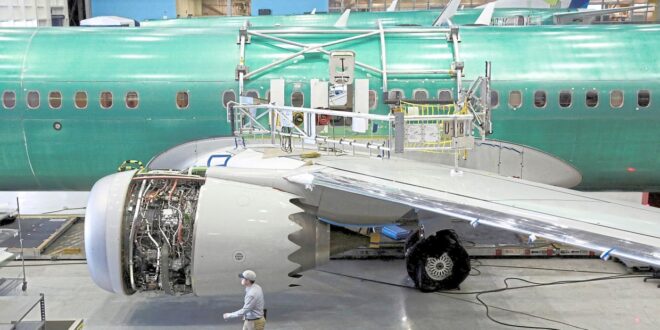HOW can a blown-out door plug on an aircraft in midair be a blessing in disguise? When the wake-up call from that near-miss accident is so loud that Boeing Co is willing to burn the cash it needs to finally get its supply chain in order.
Boeing chewed through nearly US$4bil of cash in the first quarter and is burning more cash (although less than US$4bil) this current quarter in part to make sure that the fuselages it receives from Spirit AeroSystems Holding Inc arrive at Boeing’s 737 factory without any glitches or missing pieces.
The company will also spend to build an inventory of parts and to make sure suppliers can deliver components at the proper tempo before cranking up production of the 737 Max to the 38 a month that’s allowed now by the Federal Aviation Administration (FAA).
None of these drastic, cash-draining measures would have been taken without that terrifying hole blown out during a Jan 5 Alaska Airlines flight.
“Shadow factories” and “travelled work” were a couple of terms repeated during Boeing’s conference call on Wednesday to discuss its first-quarter results. These are the symptoms of the supply-chain chaos that the planemaker allowed to persist for too long.
Now under the microscope of the FAA, its airline customers and the flying public, Boeing’s management has vowed to stamp out these pernicious practices at any cost.
The shadow factories refer to aircraft that are mostly completed but not ready to go and are parked elsewhere to keep the factory line moving. Those planes must be worked on outside of the normal routine, raising costs and, worse, increasing the possibility of mistakes.
Travelled work is the same concept, but on a partially built plane, which is moved down the assembly line even though work at a particular station hasn’t been finished. Often, this is because of a lack of available parts or sub-assemblies from suppliers that haven’t been completed or have faulty work.
The aerospace supply chain arguably suffered the most damage and has been one of the last to recover from the shutdowns and labour shortages caused by the pandemic. That’s because aerospace companies produce specialised parts in a low-volume industry that requires highly skilled workers.
In some cases, a small machine shop may be the only source of a component. These suppliers didn’t have anywhere to turn when their business was disrupted, and it has been difficult to replace the workers they lost during the pandemic.
Spirit AeroSystems, which was spun out of Boeing two decades ago, has been the most obvious supply-chain snag. To keep up with the production tempo, the company was sending fuselages that weren’t completed or had problems. This required Boeing to rework them before continuing the manufacturing process.
Boeing, which has agreed to purchase Spirit, has sent a team of inspectors to Spirit’s factory in Wichita, Kansas, and no longer accepts any fuselages that haven’t passed a full inspection.
Boeing is providing this type of support and demand for performance from all its suppliers, chief executive officer Dave Calhoun said on the conference call.
“While near-term delivery shortfalls hurt and will affect our performance during our first half of the year, the long-term benefits from a synchronised supply chain will be substantial,” said Calhoun, who under pressure from airline customers has agreed to step down by the end of the year.
This doesn’t mean that Boeing is out of the woods yet. Another accident caused by Boeing would be devastating. The company can’t afford a strike from its 32,000 workers represented by the International Association of Machinists, whose contract expires Sept 12.
The company also can’t keep burning cash at the current rate for the whole year. Boeing had US$7.5bil in cash at the end of March, down from US$16bil at the end of last year, and a US$10bil untapped credit line.
The supply chain continues to be fragile. Boeing, for example, had to move its supplier of heat exchangers from Russia, and now the supplier hasn’t been able to keep up, Calhoun said.
The recipe for getting Boeing’s factories operating properly is now on the right course, and it’s going to be expensive.
Investors and airlines, who want Boeing to crank up production, must have patience. They know that now, especially after that blown-out door plug. — Bloomberg
Thomas Black is a Bloomberg Opinion columnist writing about the industrial and transportation sectors. The views expressed here are the writer’s own.
 BeritaKini.biz Berita Viral Terkini di Malaysia
BeritaKini.biz Berita Viral Terkini di Malaysia





